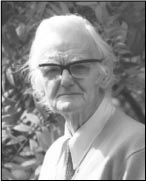 Humphry Osmond, M.D.
Humphry Osmond, M.D.
1917-2004 Hall of Fame 2004 Linus Pauling wrote: "In 1967, I happened to read a number of papers published by two psychiatrists in Saskatchewan, Canada. Dr. Abram Hoffer and Dr. Humphry Osmond. (T)here was something extraordinary about their work. They were giving very large amounts of niacin to the schizophrenic patients, as much as 17,000 milligrams per day, which is 1,000 times the RDA. I was astonished that niacin and ascorbate, with the striking physiological property, when given in very small amounts, of preventing death from pellagra and scurvy, should be so lacking in toxicity that 1,000 times the effective daily intake could be taken by a person without harm. This meant that these substances were quite different from drugs, which are usually given to patients in amounts not much smaller than the lethal dosages. I thought that these substances, normally present in the human body, and required for good health and life, deserved a name to distinguish them from ordinary Pharmaceuticals, and I decided to call them 'orthomolecular' substances." (Linus Pauling in His Own Words: Selections from his Writings, Speeches and Interviews, edited by Barbara Marinacci. NY: Simon and Shuster, 1995.) Dr. Humphry Osmond's remarkable medical career included decades of distinguished psychiatric practice and a prodigious output of writing and research. He is widely recognized as a pioneer investigator into the chemistry of consciousness. Along with Dr. John Smythies, Osmond developed the theory that schizophrenics suffer due to endogenous production of an adrenalin-based hallucinogen. This led to the Hoffer-Osmond Adreno-chrome Hypothesis in the early 1950s, the very origin of orthomolecular medicine. The popular press may today remember Humphry Osmond for coining the term "psychedelic," but countless thousands of grateful patients will remember him as the co-discoverer of niacin therapy for schizophrenia. A bibliography of Dr. Osmond's work is posted at http://www.doctoryourself.com/biblio_osmond.html
|